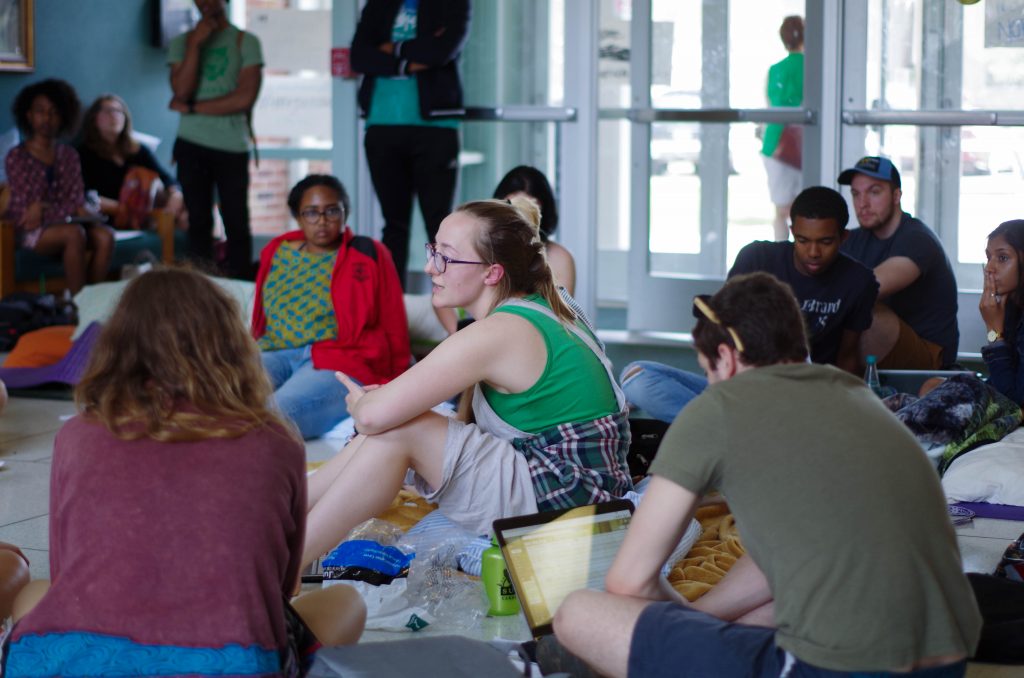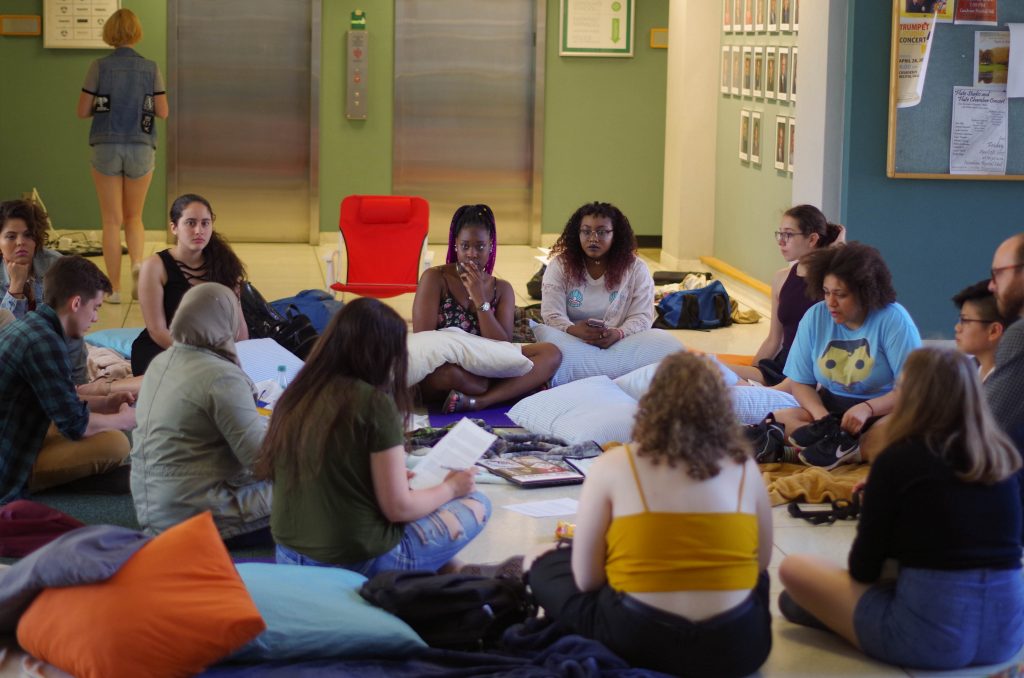“We’ve started referring to it as a dystopian ‘Home Alone.’”
Heading into the 80th hour of occupying the Couper Administration Building, Farihah Akhtar, a junior majoring in political science, described what she and over 40 students had begun calling the building they had spent the weekend in.
The occupation began on Thursday, April 27 at 1:30 p.m., with students voicing their disapproval of Binghamton University’s plan to install blue-light call boxes and camera system. Led by the Frances Beal Society, the group gathered at the Pegasus Statue before heading to the administration building. There, students began to occupy the lobby, asking to speak to Brian Rose, vice president for student affairs at BU.
Rose issued a statement on Friday in response to the students, but the group claims it did not address their key concerns. The statement reaffirmed the University’s commitment to support public safety in the city of Binghamton, and stated that for the remainder of this year, funds will only be allocated to one-time projects supported by a newly instituted Town Gown Advisory Board that will be launched in the fall of 2017.
“Binghamton University has a deep connection to the surrounding community through its students, faculty and staff, its facilities, programs, research and other contributions,” Rose said in the statement. “Those connections create many contexts for University-community interaction.”
Students continued to occupy the building into the weekend, receiving food, supplies and support from fellow students and faculty. Some rotated shifts so members could attend class or work without leaving the lobby empty.

On Sunday, those occupying the building invited students, faculty and community members to a potluck dinner to further discuss plans for the movement. At the meeting, students passed out copies of the Frances Beal Society’s demands. These call for a written statement in which the administration states it will not devote resources to the blue-light initiative, that no funds originating from the University will go toward policing or surveillance in the city of Binghamton, and that the administration will never support construction of policing and surveillance infrastructure using funds originating within the city of Binghamton, Broome County, New York state or any other funding source.
“Tonight we want to talk about what we’re doing here, why we’re doing this and we also want to hear your feedback,” said Jessica Dunn, a senior triple-majoring in sociology, Latin American and Caribbean Area studies and Africana studies. “Do you think this is a good idea? Is there stuff we could be doing better? How can we improve? Some of us are having these conversations individually, but having it collectively would make this effort stronger.”
Conversations ranged from increased transparency from both the occupation movement and the BU administration, the role of the Roosevelt Institute at BU in the blue-light initiative and the practicality of the Frances Beal Society’s demands.
One of the most stressed aspects of the Frances Beal Society’s demands was the need for at least four town hall meetings with community members and organizations. According to the occupiers, since students do not know what’s best for the community, local members must be consulted on issues that affect their lives. These town hall meetings will be completely democratic in nature, in order to best address what community members view as the community’s needs.
Students also repeatedly highlighted the need to redefine what threatens college students. Akhtar said suicide is the second biggest killer of college-age adults, with the first being accidental deaths.
“I really think that it is important we readdress what we mean by safety,” Akhtar said. “For Binghamton’s community, being in a food desert is unsafe. Having an opioid epidemic where there are no health care resources is unsafe. Not being able to see a counselor when you really, really need to is unsafe.”
Milton Chester, assistant dean for off campus programs and services, attended the gathering, and said that while the group’s ideas were valid, off-campus safety is an issue that the University should not ignore.
“There are some safety concerns in Downtown Binghamton that I do believe the University needs to be concerned with,” Chester said. “I hope that doesn’t get lost in all of this. Over the years, I’ve seen multiple reports of issues that involve our students and that I don’t think we can ignore. We don’t want to diminish that.”
Gillian Norbutt, an undeclared freshman, clarified that the occupiers had no intention of ignoring student safety. But, they said, there needed to be a change in how the University makes decisions, especially when yielding economic authority. According to them, the main goal is to make sure there is increased community input, and that those who live in the city of Binghamton are fully represented.
Norbutt also addressed some apparent student unrest that those who opposed blue-lights also were ignoring issues of sexual assault and violence. Norbutt said that they, along with many of the occupiers, attended the Take Back the Night rally in Binghamton
“We are very cautious of sexual assault, and it is not something we ignore,” Norbutt said. “But there is also a flawed narrative that attackers are strangers lurking in the bushes, waiting to jump out. Attackers are overwhelmingly people that the victims know.”
Since the occupation began, the Frances Beal Society has gained support from the Graduate Student Organization, the Student Association, Justice and Unity for the Southern Tier and other campus organizations. Another rally is set for Monday, May 1 at 1 p.m. on the Spine. The occupiers said they will stay in the administration building until their demands are met.



